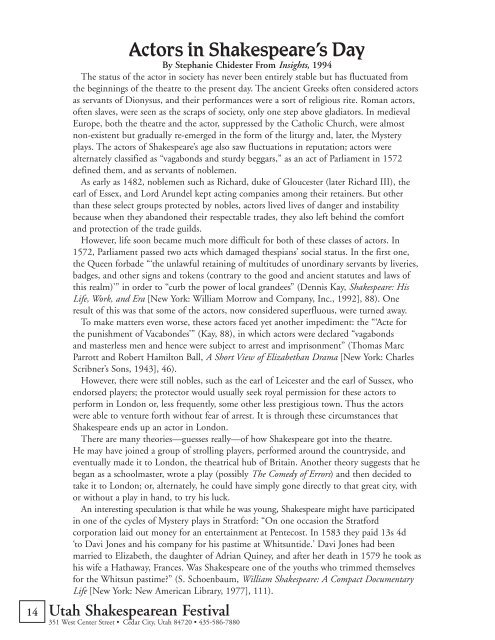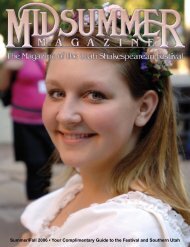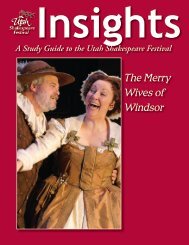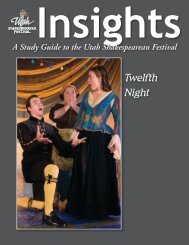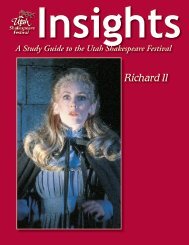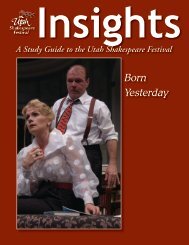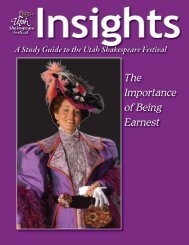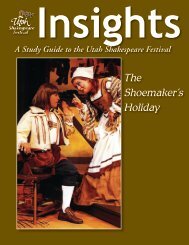Romeo and Juliet - Mr. Robertson's Bunker
Romeo and Juliet - Mr. Robertson's Bunker
Romeo and Juliet - Mr. Robertson's Bunker
You also want an ePaper? Increase the reach of your titles
YUMPU automatically turns print PDFs into web optimized ePapers that Google loves.
14Actors in Shakespeare’s DayBy Stephanie ChidesterFrom Insights, 1994The status of the actor in society has never been entirely stable but has fluctuated fromthe beginnings of the theatre to the present day. The ancient Greeks often considered actorsas servants of Dionysus, <strong>and</strong> their performances were a sort of religious rite. Roman actors,often slaves, were seen as the scraps of society, only one step above gladiators. In medievalEurope, both the theatre <strong>and</strong> the actor, suppressed by the Catholic Church, were almostnon-existent but gradually re-emerged in the form of the liturgy <strong>and</strong>, later, the Mysteryplays. The actors of Shakespeare’s age also saw fluctuations in reputation; actors werealternately classified as “vagabonds <strong>and</strong> sturdy beggars,” as an act of Parliament in 1572defined them, <strong>and</strong> as servants of noblemen.As early as 1482, noblemen such as Richard, duke of Gloucester (later Richard III), theearl of Essex, <strong>and</strong> Lord Arundel kept acting companies among their retainers. But otherthan these select groups protected by nobles, actors lived lives of danger <strong>and</strong> instabilitybecause when they ab<strong>and</strong>oned their respectable trades, they also left behind the comfort<strong>and</strong> protection of the trade guilds.However, life soon became much more difficult for both of these classes of actors. In1572, Parliament passed two acts which damaged thespians’ social status. In the first one,the Queen forbade “‘the unlawful retaining of multitudes of unordinary servants by liveries,badges, <strong>and</strong> other signs <strong>and</strong> tokens (contrary to the good <strong>and</strong> ancient statutes <strong>and</strong> laws ofthis realm)’” in order to “curb the power of local gr<strong>and</strong>ees” (Dennis Kay, Shakespeare: HisLife, Work, <strong>and</strong> Era [New York: William Morrow <strong>and</strong> Company, Inc., 1992], 88). Oneresult of this was that some of the actors, now considered superfluous, were turned away.To make matters even worse, these actors faced yet another impediment: the “‘Acte forthe punishment of Vacabondes’” (Kay, 88), in which actors were declared “vagabonds<strong>and</strong> masterless men <strong>and</strong> hence were subject to arrest <strong>and</strong> imprisonment” (Thomas MarcParrott <strong>and</strong> Robert Hamilton Ball, A Short View of Elizabethan Drama [New York: CharlesScribner’s Sons, 1943], 46).However, there were still nobles, such as the earl of Leicester <strong>and</strong> the earl of Sussex, whoendorsed players; the protector would usually seek royal permission for these actors toperform in London or, less frequently, some other less prestigious town. Thus the actorswere able to venture forth without fear of arrest. It is through these circumstances thatShakespeare ends up an actor in London.There are many theories—guesses really—of how Shakespeare got into the theatre.He may have joined a group of strolling players, performed around the countryside, <strong>and</strong>eventually made it to London, the theatrical hub of Britain. Another theory suggests that hebegan as a schoolmaster, wrote a play (possibly The Comedy of Errors) <strong>and</strong> then decided totake it to London; or, alternately, he could have simply gone directly to that great city, withor without a play in h<strong>and</strong>, to try his luck.An interesting speculation is that while he was young, Shakespeare might have participatedin one of the cycles of Mystery plays in Stratford: “On one occasion the Stratfordcorporation laid out money for an entertainment at Pentecost. In 1583 they paid 13s 4d‘to Davi Jones <strong>and</strong> his company for his pastime at Whitsuntide.’ Davi Jones had beenmarried to Elizabeth, the daughter of Adrian Quiney, <strong>and</strong> after her death in 1579 he took ashis wife a Hathaway, Frances. Was Shakespeare one of the youths who trimmed themselvesfor the Whitsun pastime?” (S. Schoenbaum, William Shakespeare: A Compact DocumentaryLife [New York: New American Library, 1977], 111).Utah Shakespearean Festival351 West Center Street • Cedar City, Utah 84720 • 435-586-7880


